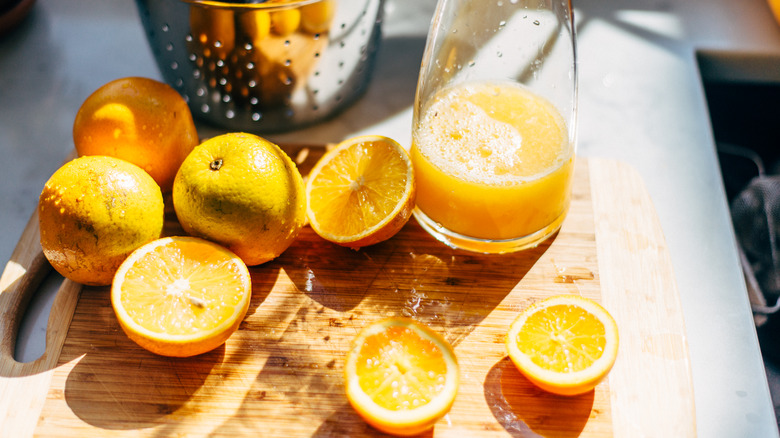Drinking Orange Juice Every Day Has An Unexpected Effect On Your Kidney Stone Risk
A glass of orange juice rounds out many people's breakfast each morning with more than a day's supply of vitamin C. Vitamin C is an important antioxidant to support your immune system. Orange juice is also a good source of potassium (and low in sodium) to keep your blood pressure in check, and you'll get 19% of your recommended folate to help with cell production.
Another benefit of orange juice that might surprise you is that it can reduce your risk of kidney stones. "Orange juice has a high citrate content, which has been well-studied to decrease stone formation, especially calcium oxalate and uric acid stones," Utsav Bansal, M.D., a urologist with Memorial Healthcare System, told Health Digest. Calcium oxalate and uric acid stones are the most common types of kidney stones.
The National Kidney Foundation says that 1 out of 10 people will get a kidney stone at some point in their lives, and chronic conditions such as high blood pressure, type 2 diabetes, and obesity can increase your risk. Bansal explained how we can modify our diet and include orange juice to prevent kidney stones.
How citrate from orange juice can prevent kidney stones
Kidney stones often form when you don't take in enough fluid, so your urine becomes concentrated with minerals, salts, and other waste products. Uric acid kidney stones form when the pH of your urine drops due to a high-protein diet. "Citrate (in orange juice) is a potent urinary inhibitor of stones by alkalinizing the urine and thus increasing urinary pH," Bansal said. "In addition, citrate binds to urinary calcium, reducing the supersaturation of urine."
To reduce your risk of kidney stones, Bansal suggests taking a look at your diet. Stay hydrated, and add a twist of lemon to your water. Limiting the amount of animal protein in your diet can lower your risk of uric acid kidney stones. Excess sodium in your diet can cause your body to excrete more calcium, causing calcium oxalate stones. If you're prone to calcium oxalate stones, limit your sodium and foods rich in oxalate, such as spinach, soy, nuts, and chocolate.
Why orange juice isn't recommended for kidney stones
A glass of orange juice might help reduce your risk of kidney stones, but Bansal said you should think twice about orange juice's high sugar content. One glass has almost 26 grams of sugar with very little fiber to slow down your blood sugar spike. The 112 calories can quickly add up if you're trying to manage your weight. "Also, the acidity can cause GI upset, enamel erosion, among other side effects," he said.
Bansal added that the amount of citrate in a glass of orange juice can vary depending on how the juice is processed. Although orange juice has less citrate than lemon juice, you'll get between 1 to 4 grams of citrate in an 8-ounce glass. "Due to the decreased citrate content, increased sugar and carbohydrate load, orange juice consumption is usually not recommended for the purpose of stone prevention," he said. Getting your citrate naturally from citrus fruits is a good alternative to orange juice or synthetic citrate supplements.


